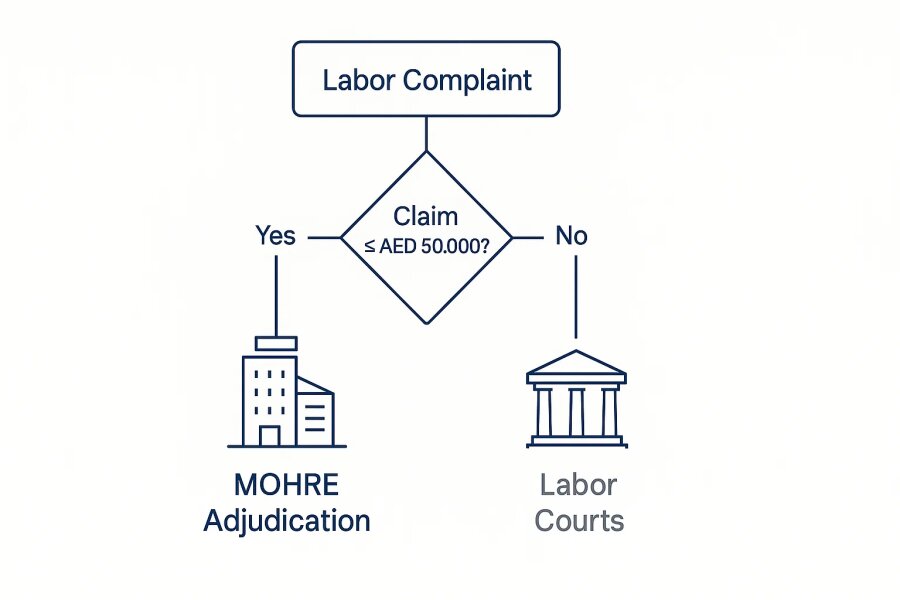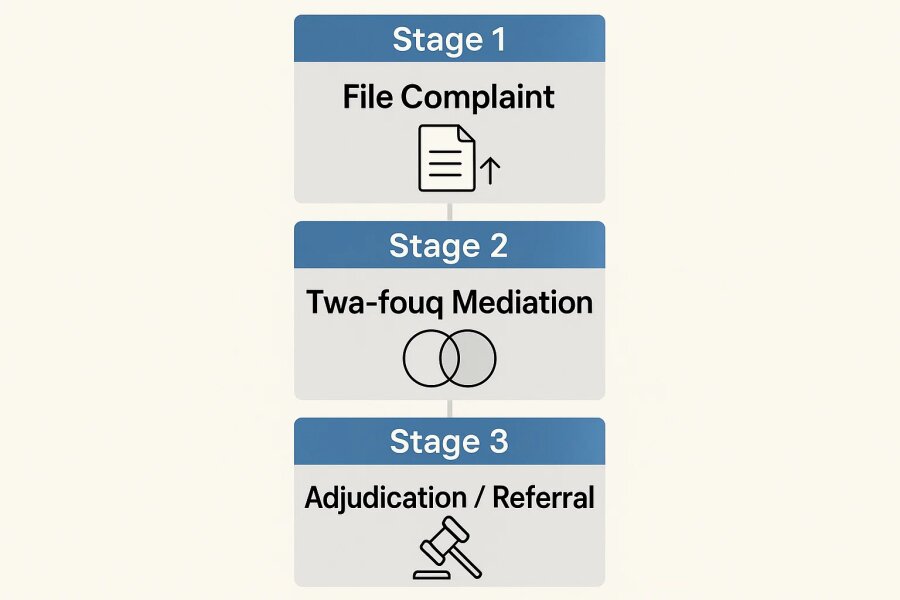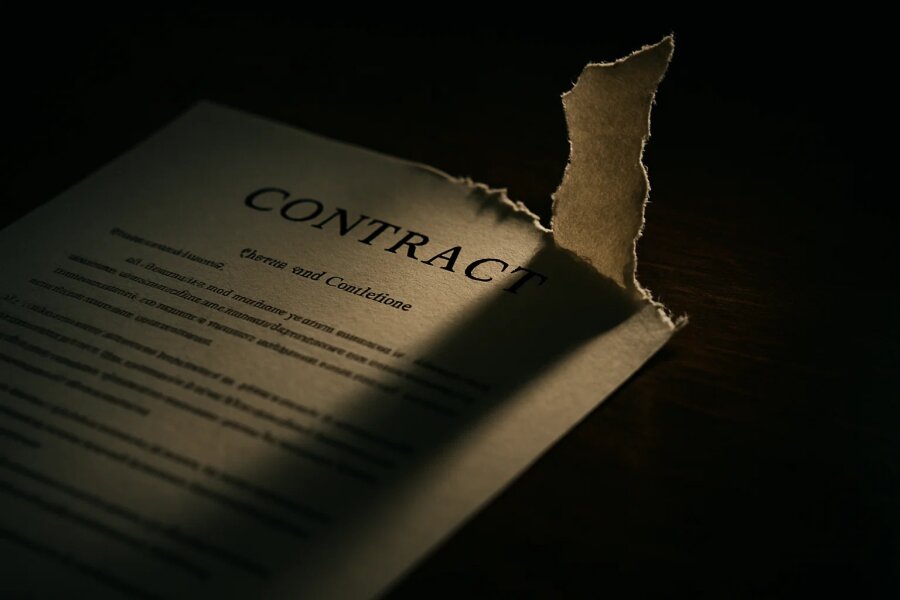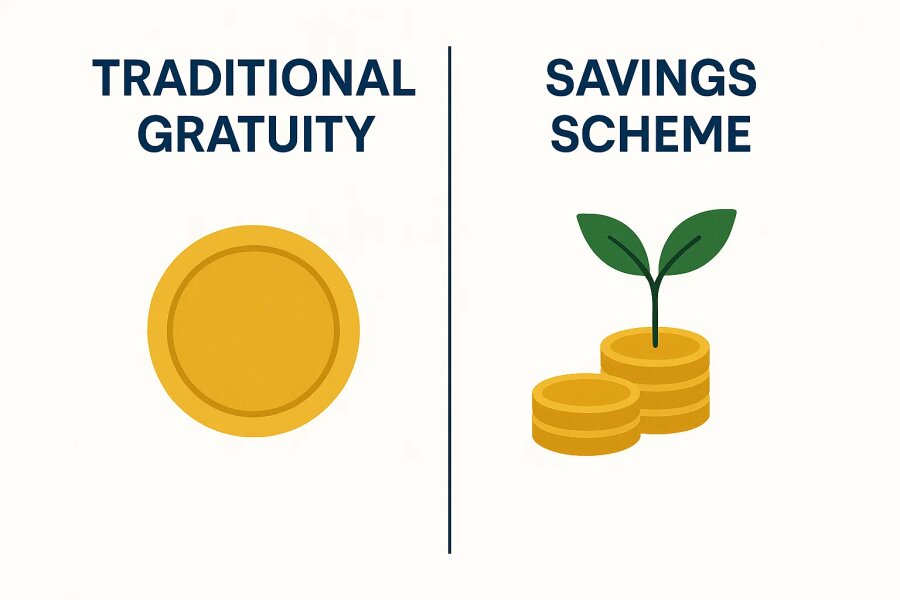Table of Contents
Introduction: A New Era for Workplace Conflict Resolution
Understanding the UAE's Employment Law Framework
- Core Employee Rights and Protections
The Revolutionary Two-Track Dispute Resolution System
- Track One: MOHRE Adjudication for Claims ≤ AED 50,000
- Track Two: The Court System for Claims > AED 50,000
The Step-by-Step Dispute Resolution Process
- Phase 1: Filing the Initial Complaint
- Phase 2: Mediation Through Twa-fouq Service Centres
- Phase 3: Adjudication and Court Proceedings
Common Areas of Dispute and Legal Principles
- Arbitrary Dismissal Claims
- End-of-Service Gratuity Disputes
Navigating the Financial Free Zones
- Dubai International Financial Centre (DIFC)
- Abu Dhabi Global Market (ADGM)
Strategic Risk Management and Best Practices
- Contract Drafting and Policy Implementation
- Documentation and Record-Keeping
- Procedural Compliance Checklists
The Role of Professional Legal Support
Conclusion: Navigating the Future of UAE Labor Disputes
The United Arab Emirates has undergone significant transformation in its employment landscape, creating a sophisticated tripartite system for labor dispute resolution in the UAE. Understanding these changes is crucial for businesses operating in the Emirates, particularly as recent legislative amendments have fundamentally reshaped how workplace conflicts are managed and resolved.
The current framework consists of three distinct jurisdictions: the federal mainland system governed by the Ministry of Human Resources and Emiratisation (MOHRE), and the separate common-law financial free zones of the Dubai International Financial Centre (DIFC) and the Abu Dhabi Global Market (ADGM). Each operates under different legal principles and procedures, making jurisdiction-specific compliance strategies essential for business success.

Understanding the UAE's Employment Law Framework
UAE labor law in 2025 represents a modern approach to workplace regulation, built upon Federal Decree-Law No. 33 of 2021, which replaced decades-old legislation with comprehensive reforms designed to enhance labor market flexibility and efficiency. This new framework came into force on February 2, 2022, establishing clear rights and obligations for both employers and when hiring employees while positioning the UAE as a competitive global talent hub.
The legislation applies to all private sector establishments operating in mainland UAE, excluding federal and local government employees and domestic workers who fall under separate regulatory frameworks. One of the most fundamental changes involves the mandatory transition to fixed-term employment contracts, requiring all employers to convert unlimited-term agreements to fixed-term arrangements capped at three years maximum.
This shift from unlimited to fixed-term contracts represents more than a technical adjustment. It fundamentally alters employment relationships by institutionalizing periodic re-evaluation opportunities for both parties. While this provides flexibility, it also requires employers to actively work to retain key talent at each renewal juncture, as contract expiration provides a natural, legally neutral exit point for employees.
The new framework also formally recognizes various modern work models including part-time, flexible work, remote work, and job-sharing arrangements. Each model requires specific work permits from MOHRE, creating a more complex compliance environment that demands sophisticated HR systems to track different contract types and apply appropriate calculation methodologies for employee entitlements.
Core Employee Rights and Protections
Understanding employees rights in the UAE requires comprehensive knowledge of the protections established under the new labor law. The framework includes robust anti-discrimination provisions prohibiting workplace discrimination based on race, color, sex, religion, national origin, social origin, or disability. Specific protections exist for pregnant employees, preventing termination due to pregnancy or maternity leave.
Leave entitlements have been significantly enhanced, including increased maternity leave of 60 calendar days (45 days at full pay and 15 days at half pay), bereavement leave provisions, and paid study leave for qualifying employees. Working hours are capped at 8 hours per day or 48 hours per week, with overtime limitations and specific exemptions for senior supervisory positions.
The end-of-service gratuity system remains a cornerstone of employee protections, providing financial security upon employment termination for expatriate workers who complete at least one year of continuous service. The calculation is based exclusively on basic salary, with tiered benefits of 21 days' pay for each of the first five years of service and 30 days' pay for subsequent years, capped at two years' total wages.
The Current Two-Track Dispute Resolution System
The most significant recent development in labor dispute resolution in the UAE came through Federal Decree-Law No. 20 of 2023, effective January 1, 2024. This legislation created a bifurcated system based on claim values, fundamentally altering how workplace disputes are processed and resolved.
Track One: MOHRE Adjudication (Claims ≤ AED 50,000)
For disputes valued at AED 50,000 or less, MOHRE now possesses judicial powers to issue final, legally binding decisions. This represents a dramatic shift from the previous system where MOHRE served primarily as a mediator. The Ministry can now investigate complaints and render enforceable judgments that carry the power of court writs of execution.
This change accelerates resolution for the vast majority of disputes involving low-to-mid-income employees but raises the stakes of the initial complaint stage significantly. Employers can no longer treat MOHRE proceedings as preliminary, non-binding mediation for smaller claims. Instead, these proceedings function as determinative legal hearings requiring careful preparation and robust evidence presentation.
Track Two: Traditional Court System (Claims > AED 50,000)
For disputes exceeding AED 50,000, the traditional escalation pathway to Labor Courts remains in effect. These cases follow the standard judicial hierarchy from Court of First Instance through Court of Appeal, with potential cassation appeals on points of law. Court fees may apply, with Dubai exempting claims under AED 100,000 from fees while charging 5% of claim value (capped at AED 20,000) for larger amounts.

Step-by-Step Dispute Resolution Process
Understanding the procedural pathway for labor dispute resolution in the UAE is essential for effective case management and strategic planning.
Phase 1: Filing the Initial Complaint
The process begins when either party files a MOHRE complaint through multiple accessible channels including the official MOHRE website, smart mobile application, or call center (600-5900-00). The complaint filing is free of charge, but employees must be registered in the Ministry's database.
Required documentation includes employment contracts, Emirates ID, and relevant correspondence supporting the claim. The complaint triggers mandatory processing through the MOHRE system before any matter can proceed to court adjudication.
Phase 2: Mediation Through Twa-fouq Service Centres
Registered complaints are referred to Twa-fouq service centres, private centers licensed by MOHRE to manage initial mediation and settlement efforts. Legal advisors typically contact both parties within 72 hours, with MOHRE targeting amicable settlement within 14 days of filing.
Successful settlements become legally binding documents. If employers fail to comply with agreed terms, employees can report non-compliance to MOHRE, which can then issue enforceable decisions compelling adherence to settlement terms regardless of original claim value.
Phase 3: Adjudication and Court Proceedings
For claims at or below AED 50,000, MOHRE conducts investigations and issues final decisions with enforcement power. Dissatisfied parties can appeal directly to the Court of Appeal within 15 working days, with appellate decisions being final and non-appealable.
For claims exceeding AED 50,000, MOHRE refers cases to Labor Courts if mediation fails. The Ministry prepares detailed memoranda including dispute summaries, party arguments, and recommendations. Complainants have 14 days to register cases with courts, which must schedule initial hearings within three working days of receiving requests.

Common Areas of Dispute and Legal Principles
Arbitrary Dismissal Claims
Arbitrary dismissal represents a significant portion of labor litigation, occurring when employment termination lacks legitimate work-related, performance-based, or conduct-based reasons. The New Labour Law explicitly prohibits retaliatory dismissal for filing legitimate complaints or lawsuits against employers.

A conceptual photo of an employment contract being torn, symbolizing the unlawful nature of an arbitrary dismissal in the UAE
Article 47 governs compensation for arbitrary dismissal, with courts determining awards based on work nature, employment duration, and material/moral damages suffered. Compensation is capped at three months' wages calculated from last received salary, awarded in addition to all statutory entitlements including gratuity and unpaid wages.
Lawful termination requires either termination with notice (30-90 days for legitimate reasons) or summary dismissal for gross misconduct under Article 44's exhaustive grounds. Summary dismissal requires formal written investigations before termination notices can be issued legally.

End-of-Service Gratuity Calculations and Disputes
Gratuity calculations frequently generate disputes due to misunderstandings about eligibility, calculation methodology, and payment deadlines. All expatriate private sector employees completing one full year of continuous service qualify for gratuity payments, while UAE and GCC nationals receive state-administered pension benefits instead.
Critical calculation points include using basic salary exclusively (excluding allowances), applying tiered formulas (21 days for first five years, 30 days thereafter), and observing the two-year total wage cap. Payment must occur within 14 days of termination, with delays constituting clear legal breaches that can trigger immediate MOHRE complaints.
The UAE has introduced an alternative end-of-service gratuity scheme allowing employers to make monthly contributions to licensed investment funds instead of maintaining lump-sum liabilities. Minimum contribution rates are 5.83% of monthly basic salary for employees with less than five years' service and 8.33% for those with five years or more.
Navigating the Financial Free Zones
The UAE's financial free zones operate entirely separate legal systems based on English common law, exempt from federal labor law and MOHRE jurisdiction. This jurisdictional separation creates significant compliance challenges for businesses operating across multiple environments.
Dubai International Financial Centre (DIFC)
DIFC Employment Law No. 2 of 2019 governs employment within the DIFC, administered entirely in English through DIFC Courts. The Small Claims Tribunal handles claims up to AED 500,000, designed for fast, informal, cost-effective resolution often without formal legal representation.
Key differences from mainland law include the mandatory DIFC Employee Workplace Savings (DEWS) scheme replacing traditional gratuity, tiered statutory notice periods based on service length (7 days for less than 3 months, 30 days for 3 months to 5 years, 90 days for over 5 years), and permission for both unlimited and fixed-term contracts.
Abu Dhabi Global Market (ADGM)
ADGM Employment Regulations 2024, effective April 1, 2025, replace previous 2019 regulations with enhanced protections and procedures. The ADGM Courts' Employment Division handles disputes through formal processes beginning with claim forms, defenses, and Case Management Conferences.
Significant developments include introducing vicarious liability principles making employers potentially liable for employee unlawful acts unless they demonstrate reasonable preventive steps, expanded discrimination protections including pregnancy and maternity with remedies up to three years' salary, formal recognition of remote employees including those outside the UAE, and specific criteria for binding settlement agreements.
Strategic Risk Management and Best Practices
Effective labor dispute resolution in the UAE requires proactive strategies rather than reactive responses to conflicts. The sophisticated multi-jurisdictional environment demands careful preparation, robust internal processes, and clear compliance frameworks.
Contract Drafting and Policy Implementation
Businesses operating across jurisdictions must develop separate, tailored employment contract templates for mainland, DIFC, and ADGM operations. Each contract must explicitly state correct governing law and designated dispute resolution forums. For mainland contracts, clear delineation between basic salary and allowances is crucial since gratuity calculations depend exclusively on basic salary definitions.
Robust internal policies covering performance management, disciplinary procedures, and grievance mechanisms must align with relevant jurisdictional requirements. Mainland policies should reflect written warning requirements before performance-based dismissals, while free zone policies should emphasize procedural fairness and employee hearing rights consistent with common law principles.
Documentation and Record-Keeping
Comprehensive documentation provides crucial evidence advantages in dispute proceedings. Employers must maintain signed contracts, performance appraisals, training records, warning letters, and disciplinary meeting minutes. For summary dismissals under Article 44, formal written investigation reports are statutory prerequisites for lawful termination.
ADGM employers must document anti-harassment policy dissemination and employee training records to build "reasonable steps" defenses against vicarious liability claims. The investment in meticulous record-keeping creates evidence trails that often determine dispute outcomes.
Procedural Compliance Checklists
Resignation rules in the UAE and termination procedures require systematic approaches to ensure legal compliance and minimize exposure. Mainland termination procedures should verify contract terms, identify legitimate reasons, document supporting evidence, conduct written investigations for misconduct cases, issue proper notice, calculate final settlements accurately, and ensure payment within 14-day deadlines.
Free zone termination procedures must review contracts and policies, establish fair reasons consistent with common law principles, follow procedural fairness requirements including employee response opportunities, provide appropriate written notice, calculate final dues including DEWS contributions or gratuity, and ensure timely payment within prescribed periods.

Seeking Professional Legal Support
The complexity of UAE labor law in 2025 and its multi-jurisdictional nature often exceeds internal HR capabilities. The stakes involved in labor disputes, particularly with MOHRE's new adjudication powers and enhanced free zone protections, make professional legal guidance essential for strategic case management.
For businesses navigating employment law challenges across the UAE's diverse legal landscape, qualified employment lawyers provide crucial expertise in compliance strategies, dispute resolution, and risk mitigation. The specialized knowledge required for each jurisdiction, from mainland MOHRE procedures to DIFC Small Claims Tribunal processes and ADGM Employment Division proceedings, demands professional guidance tailored to specific operational contexts.
In Dubai's particularly complex environment, where businesses may operate across mainland and DIFC jurisdictions simultaneously, specialized labor law expertise becomes even more critical for ensuring comprehensive compliance and effective dispute management strategies.
Looking at Labor Dispute Resolution in the UAE
The evolution of labor dispute resolution in the UAE reflects the Emirates' commitment to creating a sophisticated, efficient employment framework that balances employer flexibility with employee protections. The 2025 landscape requires businesses to adopt jurisdictionally aware strategies, proactive compliance measures, and robust internal processes to navigate successfully.
The empowerment of MOHRE to adjudicate smaller claims streamlines resolution for most disputes while the continued development of common law frameworks in financial free zones serves international business communities. This increasing legal sophistication demands corresponding evolution in corporate compliance and human resources strategies.
The central message for enterprises operating in the UAE is that employment law risk is most effectively managed through careful preparation before disputes arise. Success requires jurisdictionally compliant contracts, fair internal procedures, diligent documentation, and clear understanding of which legal framework governs each employee relationship. In this complex environment, professional legal guidance often proves essential for maintaining compliance while protecting business interests and employee rights effectively.



